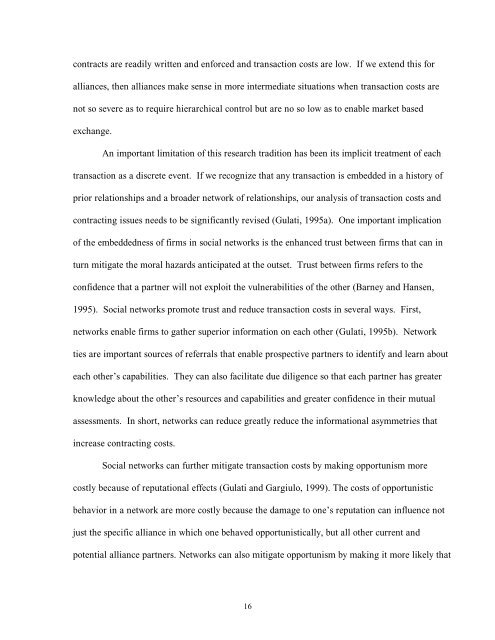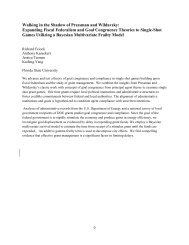STRATEGIC NETWORKS Ranjay Gulati, Nitin Nohria, Akbar Zaheer ...
STRATEGIC NETWORKS Ranjay Gulati, Nitin Nohria, Akbar Zaheer ...
STRATEGIC NETWORKS Ranjay Gulati, Nitin Nohria, Akbar Zaheer ...
Create successful ePaper yourself
Turn your PDF publications into a flip-book with our unique Google optimized e-Paper software.
contracts are readily written and enforced and transaction costs are low. If we extend this foralliances, then alliances make sense in more intermediate situations when transaction costs arenot so severe as to require hierarchical control but are no so low as to enable market basedexchange.An important limitation of this research tradition has been its implicit treatment of eachtransaction as a discrete event. If we recognize that any transaction is embedded in a history ofprior relationships and a broader network of relationships, our analysis of transaction costs andcontracting issues needs to be significantly revised (<strong>Gulati</strong>, 1995a). One important implicationof the embeddedness of firms in social networks is the enhanced trust between firms that can inturn mitigate the moral hazards anticipated at the outset. Trust between firms refers to theconfidence that a partner will not exploit the vulnerabilities of the other (Barney and Hansen,1995). Social networks promote trust and reduce transaction costs in several ways. First,networks enable firms to gather superior information on each other (<strong>Gulati</strong>, 1995b). Networkties are important sources of referrals that enable prospective partners to identify and learn abouteach other’s capabilities. They can also facilitate due diligence so that each partner has greaterknowledge about the other’s resources and capabilities and greater confidence in their mutualassessments. In short, networks can reduce greatly reduce the informational asymmetries thatincrease contracting costs.Social networks can further mitigate transaction costs by making opportunism morecostly because of reputational effects (<strong>Gulati</strong> and Gargiulo, 1999). The costs of opportunisticbehavior in a network are more costly because the damage to one’s reputation can influence notjust the specific alliance in which one behaved opportunistically, but all other current andpotential alliance partners. Networks can also mitigate opportunism by making it more likely that16




